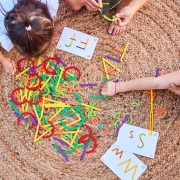Emotional Regulation Through Play: Supporting Children Starting School
Starting school is one of the most exciting and sometimes overwhelming milestones in a child’s early years. It marks the beginning of new friendships, routines, and opportunities for learning. Alongside the thrill, children may also experience big emotions such as anxiety, frustration, or uncertainty. For parents and caregivers, helping children develop emotional regulation, the ability to recognise, express, and manage feelings, is a vital part of preparing them for this transition.
At Edx Education, we believe play is one of the most powerful tools for nurturing emotional regulation. Through play, children practice patience, resilience, collaboration, and problem-solving all skills they’ll carry with them into the classroom and beyond
Why emotional regulation matters for school readiness.
Children who can manage their emotions are better able to;
- Focus on tasks and follow instructions. Build positive relationships with peers and teachers.
- Cope with challenges like waiting their turn or tackling tricky activities.
- Develop confidence and independence in their learning.
Play provides the perfect environment for children to explore and understand their feelings in a safe, supportive way. Whether through imaginative role play, building with blocks, or experimenting with numbers, children learn to self-regulate by practicing trial and error, experiencing small frustrations, and celebrating successes.
Play as a pathway to emotional growth.
Let’s look at how different types of play can help children regulate their emotions while also building strong foundations in maths, literacy, STEAM, and creativity:
- Maths play with Math Cubes and Linking Cubes Building towers, patterns, or solving number problems with Math Cubes or Linking Cubes encourages patience and persistence. When children make a mistake such as their tower toppling they learn to try again, manage frustration, and problem-solve. Caregivers can model positive language, such as “Let’s try a different way,” helping children reframe challenges.
- Creativity and mindfulness with Rainbow Pebbles® Our Rainbow Pebbles® are wonderful for imaginative play and mindful moments. Children can sort by colour, size, or shape, or create pictures and patterns. The soothing, tactile experience helps calm anxious feelings, while the open-ended design builds confidence in making choices. Activities like balancing the pebbles or arranging them into familiar shapes also support focus and fine motor skills.
- STEAM exploration with GeoStix® GeoStix® are bendable sticks that can be connected to form endless designs from letters and numbers to imaginative creatures. When children work on a creative project, they practice focus and resilience. If their structure doesn’t work as planned, they learn adaptability and flexible thinking key skills for emotional regulation and later STEAM learning.
- Imagination and role play – Role play allows children to explore different emotions and social situations. By acting out being a teacher, shopkeeper, or doctor, they develop empathy and social awareness. Role play also gives caregivers an opportunity to gently guide children in expressing feelings, such as using words instead of tears when frustrated.
- Games for turn-taking and patience. Simple games whether matching colours, solving puzzles, or building structures together teach children to wait their turn, share, and celebrate others’ success. These experiences are crucial for managing emotions in group settings like classrooms.
Tips for parents and caregivers:
– Model calmness: Children mirror our behaviour. Use calm language and demonstrate problem-solving when things don’t go as planned.
– Celebrate effort: Praise persistence and creativity, not just results.
– Create a safe space: Use toys like Rainbow Pebbles® or Linking Cubes for quiet play when children feel overwhelmed.
– Encourage storytelling: Ask your child to describe their creations. This helps them process feelings and develop communication skills.
Play, Learn & Create with Edx Education
For more inspiration, our podcast Play, Learn & Create with Edx Education shares expert insights on how play supports emotional, social, and cognitive development. We also offer free downloadable resources for parents and educators looking for fun, practical activities.
Emotional regulation is not something children develop overnight it’s built through consistent practice, supportive guidance, and plenty of playful opportunities. By engaging with toys like Math Cubes, Linking Cubes, Rainbow Pebbles®, and Junior GeoStix®, children not only strengthen their academic foundations but also grow the resilience, confidence, and self-control they need to thrive at school and beyond.
By Heather Welch, Author of Happy Children Play and General Manager of Edx Education



